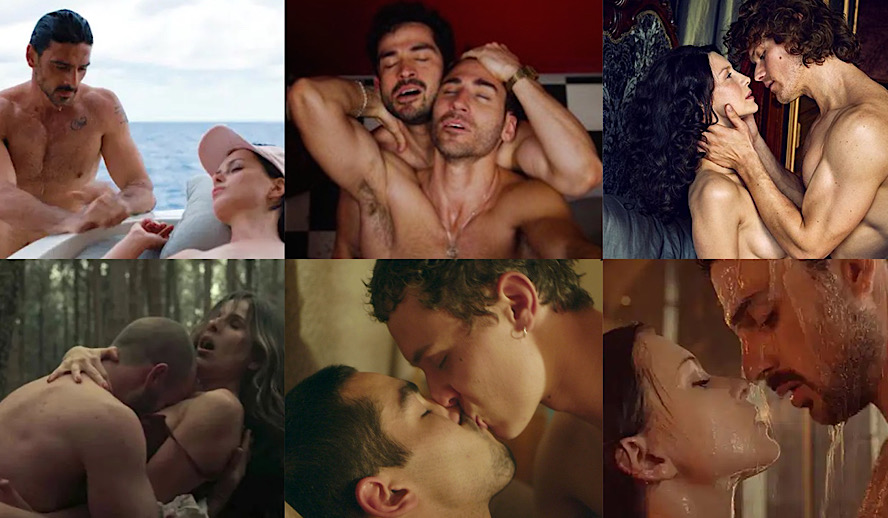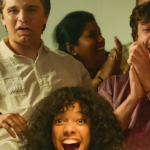Table of Contents

Photo: Sex in Movies and TV
Phrases like “Netflix and Chill” are culturally ubiquitous now, the double-entendre meaning: to engage in sexual activity while watching something on Netflix, but something seems to be missing on Netflix these days: nudity. Long gone are the days where you’d subscribe to a subscription service like Netflix or HBO to see people get naked and naughty on-screen in the comfort of your home, watching shows like ‘Game of Thrones’ or ‘Sense 8’. Well, maybe not quite yet, but there has been a change on these platforms, almost imperceptible to the naked eye; it’s been slow and gradual, as these sorts of things tend to be; but there seems to be less and less skin on these streaming services.
Related article: The Complete List of 2021 Oscar Nominations – Celebrations, Surprises & Snubs | The Show Must Go On
Related article: April Movies Release Schedule: The Most Accurate List of Every Movie Coming Out in April – Live Updates
Does SEX Sell?
Recently, while re-watching ‘House of Cards’, I was struck by the evolving depiction of sex over the course of the series: from topless romps with Frank Underwood at the beginning of the show to the more tame, clothed encounters between characters later in the series, and while there may have been narrative reasons for this, it was still a very noticeable change, a palpable absence, if you will; but, then again, a lot has changed in the real-world from the beginning of the series to its conclusion several years ago.
‘House of Cards’ was one of Netflix’s first original programs back in 2013, a benchmark for what followed later in the decade, as Netflix relentlessly continued to develop and release new content, both movies, and television, for their platform, but, at the time of its initial release, ‘House of Cards’ was just fighting for its place within television’s cultural milieu, to be a part of television’s “golden age”, to stand amongst shows like ‘Mad Men’, ‘Breaking Bad’, ‘True Detective’, and so on; and, of course, when a show has as much prestige as ‘House of Cards’ had, attracting the likes of David Fincher, Kevin Spacey, and Robin Wright, it’s bound to make for great television.
Related article: The Request of A Teenage Girl: It is Time Hollywood Changed the Way it Depicted Sex and Sexual Assault in Cinema/TV to Stop Harming Teenagers
But ‘House of Cards’ also had another thing going for it, which was: one of the benefits of subscribing to a service like Netflix, which HBO had long since understood and capitalized on, was that you could see things that you couldn’t ordinarily see on a cable or a network television show: nudity. However, as Netflix has gotten bigger and bigger, this phenomenon seems to have gotten rarer and rarer. Sure, there’s still nudity on Netflix: provocative movies like Gaspar Noe’s ‘Love’ are on the platform (last time I checked), there’s plenty of foreign television shows that feature nudity on service, and Netflix’s popular adaptation of The Witcher series contains nude scenes; but here’s the thing: it doesn’t seem like people care as much as they did before; so the question remains: does sex still sell like it used to?
Subscribe to Hollywood Insider’s YouTube Channel, by clicking here.
It’s Either Us or Them
I studied film in school, so while I know there are all sorts of complex economic theories, systems, etc. to describe its processes, I also believe that any economics major would tell you it’s more simple than that: economics is all about supply and demand, that is, what do people want and how much of that can be sold to them so that they’ll continue to want. It’s a system that quantitatively measures desire. Capitalism functions as a system precisely because it does just that at its essence: measures our desire for its products, allowing us to shape its being, and, in that way, it endures as a system; but something else also happens simultaneously: it shapes us.
Why am I talking about this? Well, the question I posed above is an economic one. Film and television are as much a business as they are art, but it’s a business, maybe more than any other, rooted in desire and not utility: what do you want to see as its audience? And so: we shape film as much as it shapes us, but, like most things in life, the relationship between these two forces is never 1:1; one always acts on the other and the other responds accordingly and does so endlessly, maybe even unconsciously.
The last television show I specifically remember people being excited for its hot content almost more than the show itself was HBO’s ‘Euphoria’, which promised the former Disney it-girl and ‘Spider-man: Homecoming’ star Zendaya’s long-awaited first topless scene. Whether this anticipation was the result of a coordinated campaign by HBO or some more primal desire or even because of Zendaya at all, is speculative, but there was a sense of anticipation, as evidenced by the conversations the show generated on social media, in publications like this, and, ultimately, in the show’s popularity with audiences.
Related article: The Power of Positivity: Ikorodu Bois + Chris Hemsworth + Russo Brothers + Sam Hargrave
Limited Time Offer – FREE Subscription to Hollywood Insider
Still, there’s no denying our culture’s sexual fixation on former Disney stars, whether it was Brittney Spears or Miley Cyrus, so there was already a sort of social precedence for wanting to see Zendaya represented sexually on screen; but was this desire so absolute in its being that it compelled Zendaya to take the role of Rue, or, even more so, that it compelled the casting directors to cast her as Rue? That’s an impossible question to answer, at least from my perspective.
More simply, the attention surrounding the show could have just been because it was this provocative new show, unafraid to talk about teenage drug addiction, show male/female nudity, and engage with other controversial subjects that people generally find interesting, the spectacles Cinema appears to love so much, so for audiences, at least in this case, there still seems to be a desire to see sex and nudity depicted on screen.
Related article: Netflix’s ‘Elite’ 2 is Sexier – Omar & Ander #Omander Prove Love Wins
#MeToo’s Hollywood
In the explosive wake of the #MeToo movement, Hollywood, at least on the surface, changed forever, its ripples continuing to echo throughout the industry. One of these ripples, called an “intimacy coordinator”, has the potential to change what we see on-screen, as they become more widely utilized on sets across Hollywood. Their job is as it sounds: they choreograph a scene’s sexual content in order to ensure a consensual act, to coordinate intimate scenes, as it were.
While we often, as viewers, believe that what we see on-screen is always consensual, this isn’t always the case, as has been reported: actors being coerced or pressured into doing a scene that they’re uncomfortable filming, usually one involving simulated sex or nudity; Emilia Clarke of ‘Game of Thrones’ is a notable example of this. It’s really no surprise then that HBO, the network that released ‘Game of Thrones’, was among the first networks/studios to formally adopt a policy of intimacy coordinators on their sets in 2018, but rather than deter the filming of sexual/nude scenes, ‘Euphoria’ was filmed, presumably under the supervision of one of these intimacy coordinators, and released a year later in 2019.
Related article: Hollywood Insider’s CEO Pritan Ambroase: “The Importance of Venice Film Festival as the Protector of Cinema”
Related article: The Masters of Cinema Archives: Hollywood Insider Pays Tribute to ‘La Vie En Rose’, Exclusive Interview with Director Olivier Dahan
If the goal of these intimacy coordinators is to prevent the exploitation of an actor on-screen, then one must still wonder, however, how this phenomenon might change the industry in the future? There’s no doubt that actors in the past have been exploited, these scenes then becoming a part of the movies we watch, maybe even movies we love, but one must wonder how many of these scenes we have already unknowingly consumed as audiences? The word ‘gratuitous’ comes to mind. How many of these gratuitous scenes have we already consumed as audiences that gave an appearance of normalcy to all the sex and nudity we got used to seeing represented in our movies and television shows?
Related article: Myers-Briggs Personality Goes Hollywood: Which Movie & TV Characters Are the Same As Your Personality Type? | The Complete Guide
If the job of an intimacy coordinator is to put an end to these gratuitous practices, then on-screen sex and nudity would necessarily be affected, and I think everyone would probably agree that this is a good thing; but it would be affected, meaning there’d be less sex, less nudity in our movies and television. As much as we can want to believe that these platforms want to do right by the actors they employ, again, they are businesses first and foremost, and it wasn’t until they were compelled to do so, more or less, that they took action to protect themselves as much as their actors because controversy sells as much as sex does (supposedly).
Related article: ‘And Just Like That’ ‘Sex and the City’ Returns in an HBO Max Limited Series With a Trio
Related article: ‘A Teacher’: Another Show Glorifying Student-Teacher Sexual Relationships?
Cuties Cuties Cuties
Though the film offers no sex or nudity (it’s a movie about twerking tweens after all), Netflix’s ‘Cuties’ was subject to intense scrutiny over its depiction of teenage sexuality, resulting in, of course, sweeping controversy and even an indictment in Texas. People threatened to cancel their subscriptions to the service on social media, to boycott the service for releasing something viewed as obscene, and whether the film is obscene or not, is a matter of personal taste. The more important question is: are films in-themselves controversial? The answer is no; they’re not. It’s audiences that generate the controversy surrounding a piece of art.
An artist can believe that the art they’re creating is controversial, but it’s not until that art becomes controversial that it is controversial; and it’s us, the audience, that allows this process to become because we’re the ones talking about the art, letting the controversy unfold. While controversy sells, a controversy relating to sex is a different story; it has the power to reshape an entire industry, to transform the business practices of that industry, as the #MeToo movement has shown us; and as businesses, they’ll decide if it’s worthwhile to continue walking the line between sex and controversy. So, does sex still sell like it used to? Well, it depends on who you ask.
An excerpt from the love letter: Hollywood Insider’s CEO/editor-in-chief Pritan Ambroase affirms, “Hollywood Insider fully supports the much-needed Black Lives Matter movement. We are actively, physically and digitally a part of this global movement. We will continue reporting on this major issue of police brutality and legal murders of Black people to hold the system accountable. We will continue reporting on this major issue with kindness and respect to all Black people, as each and every one of them are seen and heard. Just a reminder, that the Black Lives Matter movement is about more than just police brutality and extends into banking, housing, education, medical, infrastructure, etc. We have the space and time for all your stories. We believe in peaceful/non-violent protests and I would like to request the rest of media to focus on 95% of the protests that are peaceful and working effectively with positive changes happening daily. Media has a responsibility to better the world and Hollywood Insider will continue to do so.”
Ways to support Black Lives Matter Movement to end systemic racism
More Interesting Stories From Hollywood Insider
– Want GUARANTEED SUCCESS? Remove these ten words from your vocabulary| Transform your life INSTANTLY
– Compilation: All James Bond 007 Opening Sequences From 1962 Sean Connery to Daniel Craig
– Do you know the hidden messages in ‘Call Me By Your Name’? Find out behind the scenes facts in the full commentary and In-depth analysis of the cinematic masterpiece
– A Tribute To The Academy Awards: All Best Actor/Actress Speeches From The Beginning Of Oscars 1929-2019 | From Rami Malek, Leonardo DiCaprio To Denzel Washington, Halle Berry & Beyond | From Olivia Colman, Meryl Streep To Bette Davis & Beyond
– In the 32nd Year Of His Career, Keanu Reeves’ Face Continues To Reign After Launching Movies Earning Over $4.3 Billion In Total – “John Wick”, “Toy Story 4”, “Matrix”, And Many More









